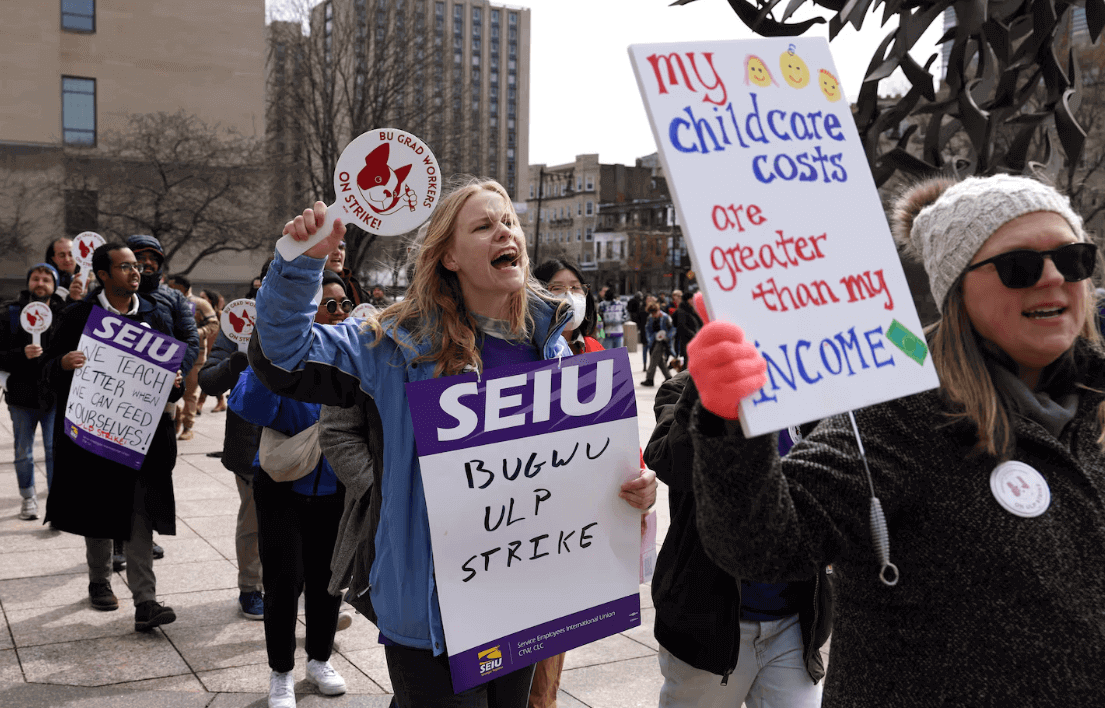波士顿大学及其研究生达成协议,可能结束为期七个月的罢工

【中美创新时报2024 年 10 月 13 日编译讯】(记者温友平编译)波士顿大学及其研究生工会已就新合同的条款达成一致,该合同将提高研究生的工资、福利和工作保障,并结束美国历史上最长的罢工。拟议的协议包括提高基本工资和扩大约 3,000 名硕士和博士生的医疗保险覆盖范围。对此,《波士顿环球报》记者Diti Kohli作了下述报道
该协议于周五下午联合宣布,结束了学校与代表 3,000 名研究生的工会之间长达七个月的争执。许多人教课、评分论文和进行研究,并认为学校严重低估了他们的基本工作报酬。
现在,这份史无前例的合同包括将博士生每年获得的津贴提高到至少 45,000 美元,或研究生每小时 20 美元的条款,这将使最低薪资的博士生获得高达 60% 的津贴。它还扩大了医疗保健福利、育儿假和通勤折扣,并引入了每年 3,500 美元的儿童保育补贴。
工会成员必须在周四之前对该协议进行投票。
英语系研究生 Meiya Sparks Lin 表示,这一努力证明了罢工是有效的,即使他们拖延。罢工有时会引起争议;该工会隶属于 SEIU Local 509,已向学校提起多项不公平的劳工行为,声称学校受到骚扰和报复。
“我们赢得了变革性要求,这将从根本上改变我们彼此之间的关系、我们与工作的关系以及我们与工作场所的关系,”Sparks Lin 说。“这将是一场持续的斗争。”
波士顿大学发言人向《波士顿环球报》介绍了一份大学新闻稿,其中教务长格洛丽亚·沃特斯称该协议“公平且具有竞争力”。她强调,该协议要求学校全年支付博士生工资,而不仅仅是学年的八个月。
“我感谢并尊重我们的研究生为了解同学的需求和维护所有研究生的需求所付出的所有时间和精力,”沃特斯说。
随着罢工持续到夏季并进入第二学年,许多波士顿大学的研究生工人已经返回工作岗位,而一小群直言不讳的组织者则在纠察线上站岗。但在两个学期中,罢工扰乱了一些课程。自三月份罢工开始以来,波士顿大学雇用的“替代工人”根据需要承担了他们的工作。
工会行动源于学生抱怨他们工作过度且工资过低。
此前,波士顿大学的研究生工人每周工作 20 小时,可获得免费学费和 8 至 12 个月的津贴,起薪分别为 26,000 美元和 39,000 美元。博士生的津贴在同样的工作量下每年在 27,000 美元至 40,000 美元之间。波士顿大学还为所有博士生支付学费和健康保险费。
另外,一名没有罢工的研究生工人正试图起诉大学并寻求集体诉讼地位,称学校在罢工期间没有向工人支付适当的工资。
波士顿大学大约 300 名住宿助理最近还与该学院签订了一份为期三年的合同,其中包括每学期 1,700 美元的津贴和负责宿舍生活的工人的膳食计划。
马萨诸塞大学阿默斯特分校劳工研究教授克莱尔·哈蒙德斯表示,波士顿大学的行为体现了学生工人对自己在大学中的角色的看法转变,也体现了他们希望自己被当做帮助学校运作的员工,而不仅仅是来这里学习的学生。许多研究生住在昂贵的地区,依靠大学作为收入来源,有时也作为住房来源。
“在公众意识中,他们是学生。那么他们为什么要赚钱呢?他们要上学,”哈蒙德斯说。“但事实上,他们做了很多工作。没有他们,没有他们所做的教学和研究,大学就无法运转。这是大学模式的一部分,人们对此感到疲惫不堪。”
题图:波士顿大学研究生 Anne Curtis(中)与其他研究生和盟友一起集会,因为波士顿大学研究生工人学生为公平薪酬、更好的医疗保险和更强的福利而罢工。Jessica Rinaldi/Globe 员工
附原英文报道:
BU and its graduate students reach deal that could end seven-month strike
The proposed agreement includes higher base pay and expanded health care coverage for roughly 3,000 masters and PhD students
By Diti Kohli Globe Staff,Updated October 11, 2024
Anne Curtis, a graduate student at Boston University (center), rallied along with fellow grad students and allies as BU graduate worker students went on strike for fair pay, better health care coverage, and stronger benefits.Jessica Rinaldi/Globe Staff
Boston University and its graduate student union have agreed on terms for a new contract that would raise the graduate students’ pay, benefits, and job protections and end the longest such strike in American history.
The agreement, announced jointly on Friday afternoon, concludes seven months of sparring between the administration and the union that represents 3,000 graduate students. Many teach classes, grade papers, and conduct research, and argued the school severely underpaid them for essential work.
Now the first-of-its-kind contract includes provisions to raise the annual stipend PhD workers receive to at least $45,000, or $20 an hour for graduate students, which would be as much as a 60 percent bump for the lowest paid PhD students. It also expands health care benefits, parental leave, and commuting discounts, and introduces a $3,500 annual subsidy for child care.
Union members have until Thursday to vote on the agreement.
Meiya Sparks Lin, a graduate student in the English department, said the effort is proof that strikes work, even when they drag on. The walkout at times got contentious; the union, which is affiliated with SEIU Local 509, has filed multiple unfair labor practices against the school claiming harassment and retaliation.
“We’ve won transformational demands that will fundamentally change our relationship to each other, to our work, and to our workplace,” Sparks Lin said. “And it’s going to be an ongoing fight.”
A BU spokesperson directed the Globe to a university news release in which provost Gloria Waters called the agreement “fair and competitive.” She emphasized that it calls for the school to pay PhD students through the year, rather than just for the eight months of the academic year.
“I appreciate and respect all of the time and effort our graduate students have put into understanding the needs of their fellow students, and advocating for the needs of all graduate students,” Waters said.
As the strike dragged through the summer and into its second academic year, many BU graduate workers had already returned to their jobs, while a smaller, vocal contingent of organizers held the picket line. But over the two semesters, the strike disrupted some classes. “Replacement workers” hired by BU covered their roles as needed since the strike started in March.
The union action arose from complaints from students that they were overworked and underpaid.
Previously, BU grad workers received free tuition and eight-to-12-month stipends starting at $26,000 and $39,000, respectively, for what is supposed to be a 20-hour work week. The stipend pay for PhD students clocked in between $27,000 and $40,000 per year for the same workload. BU also pays for the tuition and health insurance premiums of all PhD students.
Separately, a graduate student worker who did not strike is attempting to sue the university and seeking class action status saying the school did not pay workers properly during the strike.
Roughly 300 resident assistants at BU also recently secured a three-year contract with the college that includes $1,700-per-semester stipends and meal plans for workers that oversee dorm life.
Clare Hammonds, a labor studies professor at the University of Massachusetts Amherst, said that the actions at BU are part of a changing perception by student workers’ of their roles at colleges and a push to be treated more like employees who help the schools function, rather than simply students there to learn. Many graduate students live in expensive areas and rely on universities as their source of income and, sometimes, housing.
“In the public consciousness, they’re students. So why would they make money? They’re going to school,” Hammonds said. “But the reality is, they do a lot of work. Universities do not function without them, without the teaching and research they do. That’s built into the model of the university, and people are exhausted by it.”

